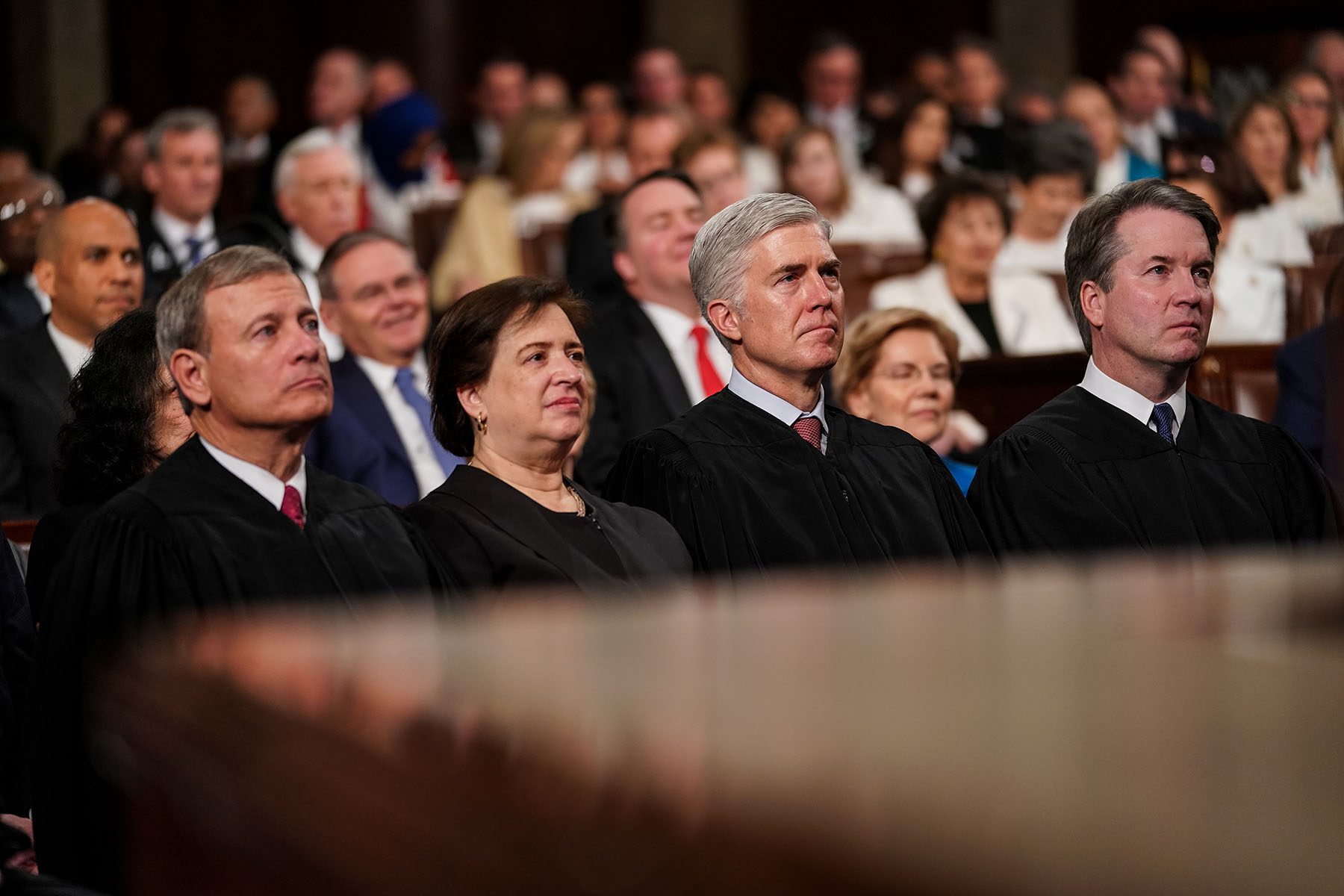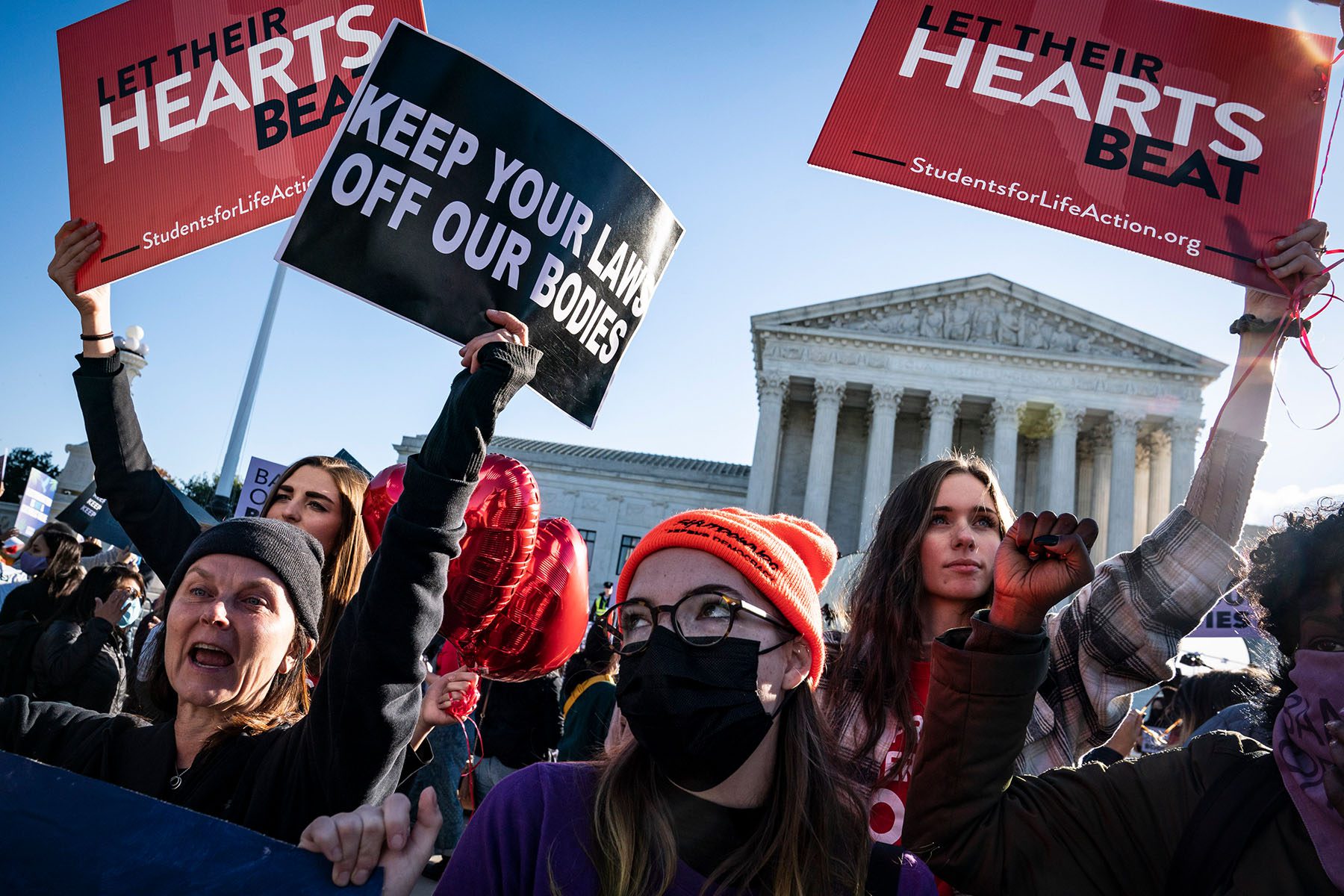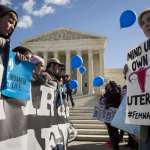The Supreme Court will hear arguments on Wednesday in a case that could end almost 50 years of guaranteed abortion rights. Audio from the arguments will be streamed on the Supreme Court’s website, beginning at 10 a.m.
Dobbs v. Jackson Women’s Health Organization examines the constitutionality of a law from Mississippi that would ban abortions after 15 weeks of pregnancy, with no exceptions for rape or incest. The law has been blocked by lower courts and has not taken effect.
Mississippi’s law appears to directly violate several decades of legal precedent on abortion rights. In 1973, the Supreme Court held in Roe v. Wade that the Constitution guaranteed the right to an abortion up until a fetus can live independently outside the womb, a stage known as “fetal viability” that typically occurs around 24 weeks of pregnancy.
That decision was affirmed in a 1992 case, Planned Parenthood v. Casey, which allowed for states to restrict abortion access as long as those laws did not impose an “undue burden” for people looking to end a pregnancy. Such an “undue burden” could involve a requirement that abortions be performed in ambulatory surgical centers — a stipulation that has been shown to have little medical benefit but that has resulted in clinics closing down, making it functionally impossible for many people to get an abortion.
The court has heard cases on specific types of abortion laws, weighing in on whether different types of restrictions and regulations violate that “undue burden” standard.
But this case poses a different kind of question. It’s an outright challenge to the core protections established in 1973. In its legal filings, the state of Mississippi has argued that the court should overturn Roe v. Wade entirely and allow states to individually determine whether abortion remains legal or not.
Such a ruling could spell the end of national abortion rights — resulting in a patchwork system across the country, where someone’s ability to access an abortion easily depends entirely on where they live.
Both anti-abortion and abortion rights advocates believe that the court, which has a 6-3 conservative majority, may be receptive to Mississippi’s arguments. Three members — Neil Gorsuch, Brett Kavanaugh and Amy Coney Barrett — were appointed by former President Donald Trump, who vowed to fill the court with justices who would vote to overturn Roe v. Wade.
All three justices voted earlier this fall to allow Texas’ six-week abortion ban to take effect. In the court’s most recent abortion case, June Medical Services LLC v. Russo, Kavanaugh and Gorsuch both dissented from the majority opinion that struck down Louisiana’s abortion restrictions. In her confirmation hearings, abortion rights advocates emphasized Barrett’s historical skepticism toward Roe v. Wade.
A decision on the case is expected at the end of the court’s term next summer.
The case could have stakes beyond abortion rights. A separate brief filed by Texas Right to Life, an anti-abortion group, argues that overturning Roe v. Wade could also pave the way to undoing two separate landmark court decisions: a 2003 case known as Lawrence v. Texas that said states could not criminalize sexual conduct between two people of the same sex, and the 2015 case Obergefell v. Hodges, which found a constitutional right to LGBTQ+ marriage.
The brief argues that Roe v. Wade’s abortion rights guarantee is a “court-invented right” without constitutional basis and claims that there is no legal basis for the rights protected in Lawrence or Obergefell either.

“Lawrence and Obergefell, while far less hazardous to human life, are as lawless as Roe,” the brief argues.
But it’s not clear how the court’s justices will receive those arguments, or whether they will be a subject of discussion in Wednesday’s hearing.
A decision to overturn Roe v. Wade would have monumental impact. According to the Kaiser Family Foundation, 18 states have laws on the books that would ban abortion entirely in the event that Roe v. Wade were to be overturned.
Entire regions of the country — particularly the South and the Midwest — would likely become abortion deserts. States like Illinois, California, Colorado and Kansas could become havens for the procedure, with people traveling hundreds of miles to access care.
In Mississippi, where Jackson Women’s Health is the only abortion-providing clinic, the next closest places to seek an abortion would be Florida, Illinois and North Carolina.
The court could find another way to uphold Mississippi’s law without giving states full authority to ban abortions completely. But such a decision would still require somehow undoing Roe v. Wade’s guarantee of abortion rights up until fetal viability — suggesting that more pre-viability abortion bans may stand legal scrutiny and allowing states to enact and enforce greater restrictions.
Meanwhile, the court is still weighing arguments in two other abortion cases, examining whether either abortion providers or the federal government have the right to challenge a Texas law that bans abortions after six weeks of pregnancy. That law, which has been in effect since September 1, has offered a cursory preview of the potential impact of overturning Roe v. Wade.
The court heard arguments in those cases on November 1. It has not yet issued a decision in either.






